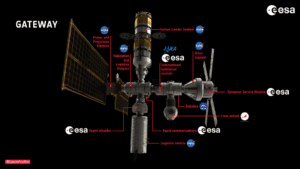
Luxembourg, 27 October 2020. – The European Space Agency (ESA) signed an agreement with NASA to contribute to the first human outpost in lunar orbit, known as Gateway, ESA announced.
ESA commits to delivering at least two European Service Modules that provide electricity, water, oxygen and nitrogen to NASA’s Orion spacecraft, ESA said. The European agency will also receive three flight opportunities for European astronauts to travel to and work on the Gateway.
The lunar Gateway will enable sustainable exploration and research around and on the Moon and demonstrate the technologies and processes necessary to conduct a future mission to Mars, ESA said. The European commitment includes building the main habitat for astronauts when they visit the Gateway, known as I-Hab.
A second European contribution is a Gateway module called ESPRIT, ESA said. It will supply enhanced communications, refueling capability and a window, similar to the European-built Cupola observatory on the International Space Station (ISS). The engagements were approved by the ESA Member States at ESA’s Space19+ Ministerial Council in Seville last year.
The European involvement with NASA’s Artemis program has been many years in the making, ESA Director General Jan Wörner said. “Throughout 20 years of continuous human presence on the International Space Station, we have seen an unparalleled level of cooperation between nations”.
The agreement with NASA “marks a critical point in Europe’s trajectory: it confirms we are going forward to the Moon, not just in terms of equipment and technology, but also with our people,” Wörner said. “Europe will play a central role in the new era of global space exploration along with NASA and our partners, delivering exemplary, game-changing architectures to explore the Moon and Mars and inspiring generations to come.”





